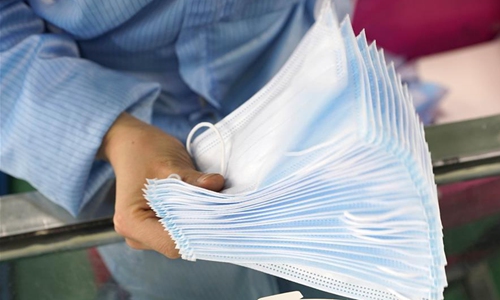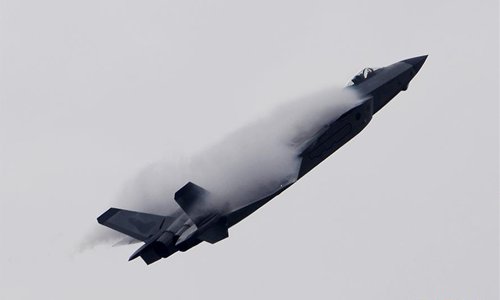HOME >> CHINA
Chinese defense firm produces medical supplies with J-20 fighter jet technology
By Liu Xuanzun Source:Global Times Published: 2020/3/16 18:33:31

A worker makes protective masks at a medical material manufacturer in Wuhan, central China's Hubei Province, Jan. 28, 2020. (Xinhua/Cai Yang)
Chinese defense companies are making machines for medical supplies using technologies originally intended for designs and manufacfuring of advanced weapons such as J-20 stealth fighter jets to ease the shortage of face masks and protective suits amid the global COVID-19 pandemic.
Their participation in the fight against the pandemic shows China's powerful strategic mobilization capability in an emergency event, analysts said on Monday.
State-owned companies, including Aviation Industry Corporation of China (AVIC), China State Shipbuilding Corporation Limited (CSSC) and China North Industries Group Corporation Limited (NORINCO), started in February designing and building related machines, the Xinhua News Agency reported on Saturday.
Using the same digital designing technology to develop the J-20 stealth fighter jet, AVIC was able to design a fully automatic face mask machine in only three days, and the first prototype was completed 16 days later, China Central Television (CCTV) reported on Friday.
This machine by AVIC can produce 100 masks a minute, non-stop for 24 hours, CCTV reported, noting that four sets of such machine have already been delivered to face mask factories across China, and 20 more are expected to be delivered by the end of March, which could make three million face masks a day.

A J-20 fighter performs at the 12th China International Aviation and Aerospace Exhibition (Airshow China) in Zhuhai, south China's Guangdong Province, Nov. 11, 2018. The air show closed on Sunday. (Xinhua)
Aircraft carrier and destroyer maker CSSC said on its website in late February that they were delivering 70 flat mask-making machines, 70 N95 mask-making machines and 90 protective suit-making machines around mid-March.
Six state-owned companies are switching production, and they are currently producing 35 to 40 protective suit machines, 25 to 30 flat mask machines and three to five stereoscopic mask machines every day, Xinhua said.
In addition to protective gear, NORINCO, China's light weaponry, munitions and armored vehicle manufacturer, also developed a high precision MEMS infrared temperature sensor to accurately monitor body temperature in real time, a company statement said last week.
China had to rely on imported products for the sensor in the past, but the domestically developed version will be mass produced by early April, NORINCO said.
Beijing-based military expert Wei Dongxu told the Global Times on Monday that arms companies hold both technological and executive advantages with highly automated production equipment and efficient management, while also having stable supplier chains, allowing them to produce many high-quality supplies on epidemic control in a short time.
This shows China's high capability to mobilize all good resources to swiftly switch production in an emergency, and the needs of the people and the country come ahead of economic benefits, Wei said.
The same model can be applied to other emergency situations, analysts said.
Although the shortage of face masks and protective suits is not as severe as it was in China as production has gradually resumed, the COVID-19 has also affected many other countries and regions, causing shortages in other places in the world.